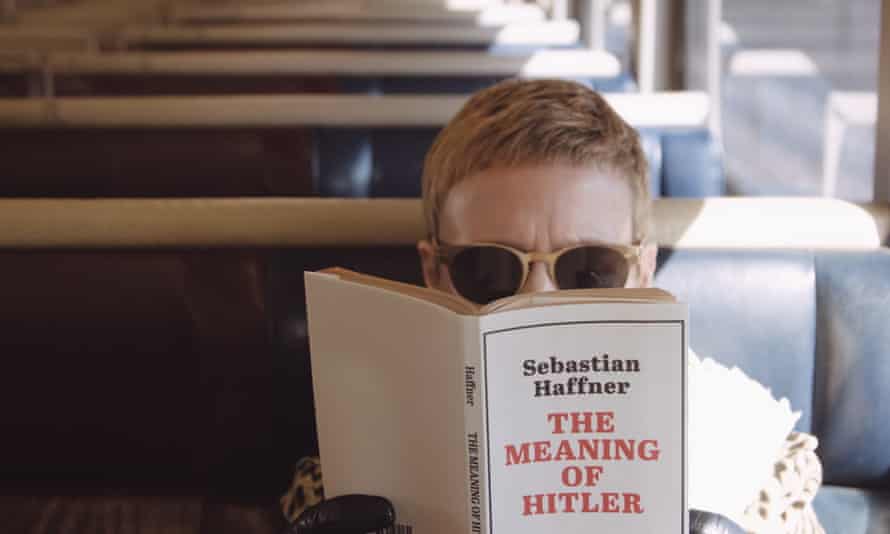In a wide-ranging new documentary, the lasting and insidious influence of the Nazi dictator is put under the microscope

‘It’s more important to see what’s right in front of us which may, in fact, be more scary.’ Photograph: Courtesy of IFC Films
David Smith in Washington
@smithinamerica
Tue 10 Aug 2021
Start a conversation about Donald Trump these days and it’s only a matter of time before someone mentions Adolf Hitler.
But if your subject is Hitler, how long before someone brings up Trump? Two minutes is all it takes in the film The Meaning of Hitler, a study of our undying fascination with the Nazi dictator directed by Petra Epperlein and Michael Tucker.

How the ‘art of the insane’ inspired the surrealists – and was twisted by the Nazis
“We might as well get on to his similarities with Trump,” says interviewee Martin Amis, the British novelist, identifying at least three: undermining the institutions of the state to magnify their own position; fanatical cleanliness; lying.
The documentary then cuts to a clip of Jewish comedian Sarah Silverman playing Hitler on late night TV, complete with toothbrush moustache and uniform, saying of Trump: “I agree with a lot he says, a lot. Like 90% of what he says, I’m like, this guy gets it!”
Trump has been moving up the autocrat analogy rankings for some time. In 2015 South African comedian Trevor Noah, new host of Comedy Central’s The Daily Show, described him as the perfect African president, evoking Idi Amin of Uganda, Robert Mugabe of Zimbabwe and especially Muammar Gaddafi of Libya.
Elsewhere comparisons were drawn with Latin American populists such as Hugo Chávez of Venzuela. And when last year Trump returned from coronavirus treatment in hospital and peeled off his face mask in a macho display on the White House balcony, the homage to Italian fascist Benito Mussolini was unmissable to all but him.
But in 2021 it is springtime for Hitler. Last month Frankly, We Did Win This Election, a book by Michael Bender of the Wall Street Journal, reported that on a visit to Europe to mark the centenary of the end of the first world war, Trump told his chief of staff, John Kelly: “Well, Hitler did a lot of good things.”
Another book, I Alone Can Fix It, by Washington Post reporters Carol Leonnig and Philip Rucker, told how General Mark Milley, chairman of the joint chiefs of staff, compared Trump’s attacks on democracy to the 1933 fire at the German parliament that the Nazis used as a pretext to consolidate power, telling aides: “This is a Reichstag moment. The gospel of the Führer.”
German-born Epperlein and American-born Tucker – a married couple whose previous work together includes Gunner Palace, The Prisoner Or: How I Planned to Kill Tony Blair and Karl Marx City – are better placed than most to tease out such parallels.
Speaking via Zoom from Berlin, a bicycle suspended on the wall behind him, Tucker says: “Clearly Donald Trump is not Hitler and sometimes that gets a little bit shrill and hysterical. It’s more important to see what’s right in front of us which may, in fact, be more scary.
“I think to both of us, by observing things and also meeting some of these experts, it became clear maybe we should be looking more at ourselves and what’s unlocked within us.”
Epperlein chimes in: “It’s not about comparing them. It’s more about seeing what happened before in history and what’s happening now or in the last few years – the normalisation of lying, for instance.
“That happened 80 years ago and that’s happened over the last few years and that is really scary because we all participate in that to a certain extent and where does it actually lead? That’s why it’s important to actually know about your history and also know about these details and what could happen.”
David Smith in Washington
@smithinamerica
Tue 10 Aug 2021
Start a conversation about Donald Trump these days and it’s only a matter of time before someone mentions Adolf Hitler.
But if your subject is Hitler, how long before someone brings up Trump? Two minutes is all it takes in the film The Meaning of Hitler, a study of our undying fascination with the Nazi dictator directed by Petra Epperlein and Michael Tucker.

How the ‘art of the insane’ inspired the surrealists – and was twisted by the Nazis
“We might as well get on to his similarities with Trump,” says interviewee Martin Amis, the British novelist, identifying at least three: undermining the institutions of the state to magnify their own position; fanatical cleanliness; lying.
The documentary then cuts to a clip of Jewish comedian Sarah Silverman playing Hitler on late night TV, complete with toothbrush moustache and uniform, saying of Trump: “I agree with a lot he says, a lot. Like 90% of what he says, I’m like, this guy gets it!”
Trump has been moving up the autocrat analogy rankings for some time. In 2015 South African comedian Trevor Noah, new host of Comedy Central’s The Daily Show, described him as the perfect African president, evoking Idi Amin of Uganda, Robert Mugabe of Zimbabwe and especially Muammar Gaddafi of Libya.
Elsewhere comparisons were drawn with Latin American populists such as Hugo Chávez of Venzuela. And when last year Trump returned from coronavirus treatment in hospital and peeled off his face mask in a macho display on the White House balcony, the homage to Italian fascist Benito Mussolini was unmissable to all but him.
But in 2021 it is springtime for Hitler. Last month Frankly, We Did Win This Election, a book by Michael Bender of the Wall Street Journal, reported that on a visit to Europe to mark the centenary of the end of the first world war, Trump told his chief of staff, John Kelly: “Well, Hitler did a lot of good things.”
Another book, I Alone Can Fix It, by Washington Post reporters Carol Leonnig and Philip Rucker, told how General Mark Milley, chairman of the joint chiefs of staff, compared Trump’s attacks on democracy to the 1933 fire at the German parliament that the Nazis used as a pretext to consolidate power, telling aides: “This is a Reichstag moment. The gospel of the Führer.”
German-born Epperlein and American-born Tucker – a married couple whose previous work together includes Gunner Palace, The Prisoner Or: How I Planned to Kill Tony Blair and Karl Marx City – are better placed than most to tease out such parallels.
Speaking via Zoom from Berlin, a bicycle suspended on the wall behind him, Tucker says: “Clearly Donald Trump is not Hitler and sometimes that gets a little bit shrill and hysterical. It’s more important to see what’s right in front of us which may, in fact, be more scary.
“I think to both of us, by observing things and also meeting some of these experts, it became clear maybe we should be looking more at ourselves and what’s unlocked within us.”
Epperlein chimes in: “It’s not about comparing them. It’s more about seeing what happened before in history and what’s happening now or in the last few years – the normalisation of lying, for instance.
“That happened 80 years ago and that’s happened over the last few years and that is really scary because we all participate in that to a certain extent and where does it actually lead? That’s why it’s important to actually know about your history and also know about these details and what could happen.”

Photograph: Courtesy of IFC Films. An IFC Films release.
Seventy-six years after his death, Hitler remains one of the most known men in the world and ubiquitous in western culture. He is the subject of endless books, TV documentaries (Hitler’s Zombie Army at 1am on Tuesday on the American Heroes Channel was followed by Hitler’s Messiah Complex at 2am) and film dramas (Downfall, Indiana Jones and the Last Crusade and many more). Tucker calls it a “Hitler industrial complex” unburdened by self-scrutiny.
He comments: “Clearly, it’s not like these materials stop the spread of the ideology or that they curb antisemitism. If anything, the more they’re presented without context, the more they propagate these ideas. Maybe it’s not that people are so fascinated by him or it as there’s something in them that’s just sort of unlocked.”
Determined to avoid contributing to the cult of personality, Epperlein and Tucker use excerpts from former Observer journalist Sebastian Haffner’s penetrating 1978 book The Meaning of Hitler as a narrative spine. They travel to Hitler’s birthplace in Austria, where a stone marker does not mention him by name, a car park in Berlin that sits above the bunker where he killed himself.
They interview historians and writers including Saul Friedlander, Francine Prose, Yehuda Bauer and Nazi hunters Beate and Serge Klarsfeld as well as an archaeologist forensic biologist, psychiatrist and sociologist in search of clues that might begin to explain how Hitler became Hitler.
But historian Deborah Lipstadt, nominated last month as US special envoy to monitor and combat antisemitism, tells them: “When we try to figure out where Hitler’s antisemitism came from, what we’re trying to do is rationally explain an irrational sentiment.
“When people say, ‘Oh well, his mother was treated by a Jewish doctor and he couldn’t save her’, so what? The minute you’re trying to give a rational explanation for an irrational sentiment, you’re going to be lost.”

Seventy-six years after his death, Hitler remains one of the most known men in the world and ubiquitous in western culture. He is the subject of endless books, TV documentaries (Hitler’s Zombie Army at 1am on Tuesday on the American Heroes Channel was followed by Hitler’s Messiah Complex at 2am) and film dramas (Downfall, Indiana Jones and the Last Crusade and many more). Tucker calls it a “Hitler industrial complex” unburdened by self-scrutiny.
He comments: “Clearly, it’s not like these materials stop the spread of the ideology or that they curb antisemitism. If anything, the more they’re presented without context, the more they propagate these ideas. Maybe it’s not that people are so fascinated by him or it as there’s something in them that’s just sort of unlocked.”
Determined to avoid contributing to the cult of personality, Epperlein and Tucker use excerpts from former Observer journalist Sebastian Haffner’s penetrating 1978 book The Meaning of Hitler as a narrative spine. They travel to Hitler’s birthplace in Austria, where a stone marker does not mention him by name, a car park in Berlin that sits above the bunker where he killed himself.
They interview historians and writers including Saul Friedlander, Francine Prose, Yehuda Bauer and Nazi hunters Beate and Serge Klarsfeld as well as an archaeologist forensic biologist, psychiatrist and sociologist in search of clues that might begin to explain how Hitler became Hitler.
But historian Deborah Lipstadt, nominated last month as US special envoy to monitor and combat antisemitism, tells them: “When we try to figure out where Hitler’s antisemitism came from, what we’re trying to do is rationally explain an irrational sentiment.
“When people say, ‘Oh well, his mother was treated by a Jewish doctor and he couldn’t save her’, so what? The minute you’re trying to give a rational explanation for an irrational sentiment, you’re going to be lost.”

Photograph: Courtesy of IFC Films
Advertisement
Thus the film presents a paradox. To try to understand Hitler is to risk humanising him and reducing his culpability; but to admit that he defies all understanding is to risk elevating him to superhuman status, to make him a modern Lucifer.
Tucker reflects: “On one side, there’s the more you try to understand him, the more empathy you have: ‘Oh, poor Hitler.’ Then there’s the other part: he’s exceptional or it’s this break in history. The Holocaust is certainly exceptional, but the conditions that can lead to that certainly exist within all of us, so it’s a tricky terrain to navigate.”
Yet there is a “Rosebud” of sorts here, a biographical key that unlocks at least part of the thinking and power of Hitler and his imitators. Perceived victimhood.
Epperlein says: “After Germany lost world war one, that of course is perceived victimhood, and Hitler was able to channel all of this and unleash it in a way which was just unprecedented.”
Tucker adds: “Just here in Berlin last weekend, there were 5,000 Covid deniers running amok through the streets, supported by some pretty hardcore neo-Nazis and it’s astonishing to see the victimhood on display. It’s like they’re acting as if they’re living in some fascist dictatorship. The repetition of that is so telling.”
Perceived victimhood also goes to the heart of Trumpism. He gained political traction by telling crowds that they are the victims of cultural, economic and political elites, of unfair trade rules and violent illegal immigrants. He constantly portrays himself as a victim of media bias and deep state conspiracies such as the Russia investigation, impeachment and a “rigged” election. His supporters appear elated by their shared community of grievance and sense that vengeance has been legitimised.
Epperlein says of Hitler and Trump: “The magic to a certain extent is that they are able to give people permission to unleash their most terrible thoughts and ideas and to voice them and to do this all together.
“It makes them feel good and powerful and strong and it can be easily moulded into a movement. You see it with Donald Trump and his followers. You see it here with these Covid deniers because it’s kind of the same thing. It’s really dangerous.”

Advertisement
Thus the film presents a paradox. To try to understand Hitler is to risk humanising him and reducing his culpability; but to admit that he defies all understanding is to risk elevating him to superhuman status, to make him a modern Lucifer.
Tucker reflects: “On one side, there’s the more you try to understand him, the more empathy you have: ‘Oh, poor Hitler.’ Then there’s the other part: he’s exceptional or it’s this break in history. The Holocaust is certainly exceptional, but the conditions that can lead to that certainly exist within all of us, so it’s a tricky terrain to navigate.”
Yet there is a “Rosebud” of sorts here, a biographical key that unlocks at least part of the thinking and power of Hitler and his imitators. Perceived victimhood.
Epperlein says: “After Germany lost world war one, that of course is perceived victimhood, and Hitler was able to channel all of this and unleash it in a way which was just unprecedented.”
Tucker adds: “Just here in Berlin last weekend, there were 5,000 Covid deniers running amok through the streets, supported by some pretty hardcore neo-Nazis and it’s astonishing to see the victimhood on display. It’s like they’re acting as if they’re living in some fascist dictatorship. The repetition of that is so telling.”
Perceived victimhood also goes to the heart of Trumpism. He gained political traction by telling crowds that they are the victims of cultural, economic and political elites, of unfair trade rules and violent illegal immigrants. He constantly portrays himself as a victim of media bias and deep state conspiracies such as the Russia investigation, impeachment and a “rigged” election. His supporters appear elated by their shared community of grievance and sense that vengeance has been legitimised.
Epperlein says of Hitler and Trump: “The magic to a certain extent is that they are able to give people permission to unleash their most terrible thoughts and ideas and to voice them and to do this all together.
“It makes them feel good and powerful and strong and it can be easily moulded into a movement. You see it with Donald Trump and his followers. You see it here with these Covid deniers because it’s kind of the same thing. It’s really dangerous.”

Photograph: Courtesy of IFC Films
Advertisement
The Meaning of Hitler includes an interview with discredited British historian David Irving, who is introduced with a giant on-screen caption (quoting from a court judgment) that says, “David Irving HOLOCAUST DENIER ANTISEMITE AND RACIST who associates with right wing extremists who promote Neo-Nazism.” Irving is seen “guiding” acolytes in Treblinka, an extermination camp in German-occupied Poland.
The film-makers debated long and hard whether to give him screen time but ultimately followed the example of Haffner’s book by engaging with him. Epperlein’s narration explains: “You can’t make a film about Hitler and not talk to his biggest admirer.”
Tucker adds via Zoom: “Yes, you can completely ignore him except if you Google he shows up everywhere. He was financially ruined by the Lipstadt case [in 2000 Irving sued Lipstadt for libel after she called him a Holocaust denier and lost] and yet has somehow flourished in this online world, as have many other people.
“He’s the granddaddy of all of this. He found a way to profitability, as have many other people who are pretty fringe and get amplified. At the same time, as shown in the film, people like Mark Zuckerberg [chief executive of Facebook] are acting as if this is just a case of people getting something wrong where this is deliberate.”
He also acknowledges: “There is a debate to be had. People like Lipstadt would say she believes in free speech, she doesn’t believe that Irving should be silenced.
“I also believe there should be a healthy, vigorous debate about this but as film-makers it was really important also to not fall into the trap: Irving is like a camera magnet, he’s like candy, he’s so compelling, he’s so twisted. In weird ways at times you feel not sympathetic for him, but you’re like, oh, he’s just an old guy and you want to understand him. But he’s -”
Epperlein interjects: “He’s full of hatred and he’s a terrible antisemite.”
The meaning of Irving, at least, is clear. Hitler, however, seems destined to continue tormenting the species that produced him, as unfathomable as he is demonic. Amis comments: “Our understanding of Hitler is central to our self-understanding. It’s a reckoning you have to make if you’re a serious person.”
This article was amended on 13 August 2021 to describe the Treblinka extermination camp as being in German-occupied Poland, in accordance with Guardian style guidance.
The Meaning of Hitler is released in select US cinemas and on demand on 13 August with a UK date to be announced
Advertisement
The Meaning of Hitler includes an interview with discredited British historian David Irving, who is introduced with a giant on-screen caption (quoting from a court judgment) that says, “David Irving HOLOCAUST DENIER ANTISEMITE AND RACIST who associates with right wing extremists who promote Neo-Nazism.” Irving is seen “guiding” acolytes in Treblinka, an extermination camp in German-occupied Poland.
The film-makers debated long and hard whether to give him screen time but ultimately followed the example of Haffner’s book by engaging with him. Epperlein’s narration explains: “You can’t make a film about Hitler and not talk to his biggest admirer.”
Tucker adds via Zoom: “Yes, you can completely ignore him except if you Google he shows up everywhere. He was financially ruined by the Lipstadt case [in 2000 Irving sued Lipstadt for libel after she called him a Holocaust denier and lost] and yet has somehow flourished in this online world, as have many other people.
“He’s the granddaddy of all of this. He found a way to profitability, as have many other people who are pretty fringe and get amplified. At the same time, as shown in the film, people like Mark Zuckerberg [chief executive of Facebook] are acting as if this is just a case of people getting something wrong where this is deliberate.”
He also acknowledges: “There is a debate to be had. People like Lipstadt would say she believes in free speech, she doesn’t believe that Irving should be silenced.
“I also believe there should be a healthy, vigorous debate about this but as film-makers it was really important also to not fall into the trap: Irving is like a camera magnet, he’s like candy, he’s so compelling, he’s so twisted. In weird ways at times you feel not sympathetic for him, but you’re like, oh, he’s just an old guy and you want to understand him. But he’s -”
Epperlein interjects: “He’s full of hatred and he’s a terrible antisemite.”
The meaning of Irving, at least, is clear. Hitler, however, seems destined to continue tormenting the species that produced him, as unfathomable as he is demonic. Amis comments: “Our understanding of Hitler is central to our self-understanding. It’s a reckoning you have to make if you’re a serious person.”
This article was amended on 13 August 2021 to describe the Treblinka extermination camp as being in German-occupied Poland, in accordance with Guardian style guidance.
The Meaning of Hitler is released in select US cinemas and on demand on 13 August with a UK date to be announced
No comments:
Post a Comment